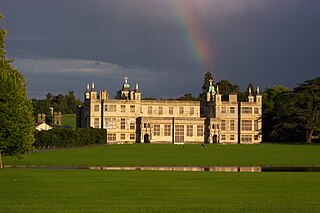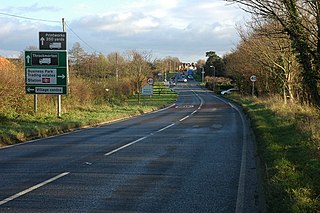Related Research Articles

Ralph Neville, 1st Earl of WestmorlandEarl Marshal, was an English nobleman of the House of Neville.

Earl of Westmorland is a title that has been created twice in the Peerage of England. The title was first created in 1397 for Ralph Neville. It was forfeited in 1571 by Charles Neville, 6th Earl of Westmorland for leading the Rising of the North. It was revived in 1624 in favour of Sir Francis Fane, whose mother, Mary Neville, was a descendant of a younger son of the first Earl. The first Earl of the first creation had already become Baron Neville de Raby, and that was a subsidiary title for his successors. The current Earl holds the subsidiary title Baron Burghersh (1624).

Baron Braybrooke, of Braybrooke in the County of Northampton, is a title in the Peerage of Great Britain. It was created in 1788 for John Griffin, 4th Baron Howard de Walden, with remainder to his kinsman Richard Neville-Aldworth. Lord Howard de Walden was the son of William Whitwell and Anne Griffin, daughter of James Griffin, 2nd Baron Griffin of Braybrooke, who was the son of Edward Griffin, 1st Baron Griffin of Braybrooke, and his wife Lady Essex Howard, eldest daughter of James Howard, 3rd Earl of Suffolk and 3rd Baron Howard de Walden.

George Neville was Archbishop of York from 1465 until 1476 and Chancellor of England from 1460 until 1467 and again from 1470 until 1471.

John Neville, 3rd Baron Neville, was an English peer, naval commander, and soldier.
The title Baron Latimer or Latymer has been created, by the definitions of modern peerage law, four times in the Peerage of England. Of these, one was restored from abeyance in 1913; one is forfeit; the other two are dormant, although their heir is well known.
George Neville, 1st Baron Latimer or (Latymer) was an English nobleman.

William Latimer, 4th Baron Latimer, KG was an English noble, soldier and diplomat. After serving in France and for the household of Edward III, he was impeached during the Good Parliament of 1376, the earliest recorded impeachment in the Parliament of England.
John Neville, 3rd Baron Latimer was an English peer. His third wife was Catherine Parr, later queen of England.

The Neville or Nevill family is a noble house of early medieval origin, which was a leading force in English politics in the later Middle Ages. The family became one of the two major powers in northern England and played a central role in the Wars of the Roses along with their rival, the House of Percy.
Miles Sandys was an English courtier and politician. He sat in each of the eight Parliaments from 1563 to 1597, yet never represented the same constituency twice.
John Neville, 4th Baron Latimer was an English peer, and the stepson of Catherine Parr, later the sixth wife of King Henry VIII.
George Neville-Grenville, named George Neville until 1825, was Dean of Windsor in the mid nineteenth century.

Richard Neville, 2nd Baron Latimer KB of Snape, North Yorkshire, was an English soldier and peer. He fought at the battles of Stoke and Flodden.

William Neville of Penwyn and Wyke Sapie, Worcestershire, was the son of Richard Neville, 2nd Baron Latimer, and the author of The Castell of Pleasure. In 1532 he was accused of treason and dabbling in magic.

George Elwes Corrie was an English churchman and academic, Master of Jesus College, Cambridge from 1849.
George Latimer Apperson (1857–1937) was a school inspector and man of letters.
Charles Cornwallis Neville, 5th Baron Braybrooke was a British peer.
Edward Neville was an English buccaneer and pirate. He is best known for joining George Spurre to raid Spanish Campeche.
Latimer Neville, 6th Baron Braybrooke, styled The Hon. Latimer Neville until 1902, was a British peer, clergyman and academic, for half a century Master of Magdalene College, Cambridge.
References
- ↑ Horn, Joyce M.; Smith, David M.; Mussett, Patrick (2004), Fasti Ecclesiae Anglicanae 1541–1857, vol. 11, pp. 18–20
- ↑ "Catalogue of the Lansdowne Manuscripts in the British Museum" London, British Museum, 1819
- ↑ Burke, Bernard (1866). A Genealogical History of the Dormant, Abeyant, Forfeited, and Extinct Peerages of the British Empire. London: Harrison. Retrieved 13 December 2012.
- ↑ "Neville, George (NVL523G)". A Cambridge Alumni Database. University of Cambridge.